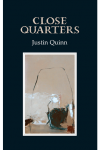 . . . As one of the founder-editors of the journal Metre, Justin Quinn’s commitment to formality is on the record. But of course — as Seamus Heaney says — a formal decision is never only formal. Quinn’s technical accomplishment is the highly effective means to an end.
. . . As one of the founder-editors of the journal Metre, Justin Quinn’s commitment to formality is on the record. But of course — as Seamus Heaney says — a formal decision is never only formal. Quinn’s technical accomplishment is the highly effective means to an end.
The title suggests the close quarters that are scrutinized in a group of family poems – from ‘Transformer Station’ to ‘Child’ – at the heart of the book. But distance is equally crucial, to a degree that almost makes the title ironic. In Prague Quinn teaches American literature at Charles University, so it is not surprising that translation and home thoughts from abroad are prominent here. The relations between all these places and languages and cultures are deftly debated in the group of four sonnets ‘On the Translator’s Art’, centring on encountering the production of Shakespeare in ‘Athens, London or Prague’:
Kings and asses, spirits at their games,
monkeys, blackamoors and villains’ lies.
Quinn’s genius is for leaving the foreign defamiliarized, as in a beautiful poem ‘Seminar’ about his Czech students:
I love the way they sit
and use their bodies to nuance what they say.
I lean forward to catch the drift of it.
When it’s ended they’ll switch back to Czech,
put on their coats and bags, shift wood and chrome
and ready themselves for their daily trek
across a continent and ocean home.
— ‘Seminar’
The students returning home from English and American literature might just as well be their teacher moving, emotionally and geographically, between Prague and Dublin, as he does in a series of poems about South Dublin here, starting with the shadows seen through the glass of the porch that, in a lovely image of memory, ‘turned everyone / to corrugated shadows’ that brought news of the world.
Another marvellous series of sonnets of all shapes and sizes, ‘The Months’, draws on the corone of the early fourteenth-century sonneteer Folgore da San Gimignano, a series in relation to which their nineteenth-century translator Dante Gabrial Rossetti wrote ‘much has been said, and in many ways justly, against the value of metrical translation’. Quinn’s versions make an eloquent case for its value (as of course Rossetti claimed for his). Quinn is a citizen of the world. What his poetry is about is attentiveness, a point made wittily in the ambiguity of the word ‘missing’ in his ‘Sonnet on Missing a Trip’ – we must not miss what is around us. Like the other two master practitioners considered here, Quinn makes a powerful case for the present utility of poetry. It is an art in good heart in several senses of the word.
— Bernard O’ Donoghue, Poetry London
To order this title visit our shop.

